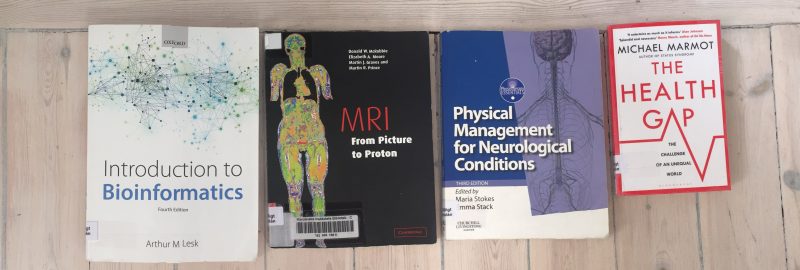
The books I’m reading to (slowly) start off my thesis research in Health Informatics
The second year of my Master studies is starting in September and these past weeks I’ve been slowly getting back into actively thinking about Health Informatics.
We’ve been off school since mid June and I’ve done it how every other Swede is doing it “Sommarstängt i Juli” (closed for summer in July). That’s why August is the month of slowly returning to normal routines (while still enjoying the Scandinavian summer to the fullest).
I’ve visited the KI library in Solna to get some books to read while I still don’t have to worry about deadlines. These are the one’s I’ve got.
Introduction to Bioinformatics
Although I do know my way around statistics, I’ve never worked with data collections in biology. Thus, I picked up this one to try to understand how biologist work with their data. As a computer scientist, I can disregard the chapters regarding databases, information retrieval and programming. To me the important chapters are the ones about what and how data can used from e.g. genomes and proteomes. I don’t know if this kind of data will necessarily be what I work with in my thesis, but I find this interesting nonetheless.
MRI – From picture to proton
This one is the one I’m most exited about reading front to back (My plan is to write my thesis in the field of neurology). Thus, the chances are high that I’ll be working with image analysis. I know the basics of how an MRI works, but this book warms my computer scientist heart as it also goes deep into the math and physics of MRI technology. What really drew me into picking this one up was that they go in reverse, meaning that they go from end product (images) to how the internal combustion engine works (protons, net magnetization etc). I believe it’s a very hands on book and I’ll see how much of it I can understand myself.
Physical Management for Neurological Conditions
In Health Informatics it is crucial to understand different diseases and disorders. Especially when it comes to the topic of e-Health. Last year I’ve worked on a project with Parkinsons disease. Thus, we had the task to develop a tool that would evolve with the patient’s needs. This book gives a good overview about neurological and neuromuscular conditions and I picked it up to broaden my knowledge and especially learn about rehabilitation processes.
The Health Gap – The challenge of an unequal world
The author of this book, Michael Marmot, gave a keynote at a conference I attended this past spring. Thus, I could recall some of this book’s content. In my opinion, it is a must read for everyone working in the health sector. It gives an overview of social determinants that should be considered when we evaluate and rethink today’s health care and social medicine. I has me thinking again how data can prove and refute our assumptions.
As you see, these books cover a broad variety of things I find interesting. I don’t even know if they will be useful when it comes down to my thesis (aka if they will be quoted). If anything, voluntarily picking up these books has proven to me that choosing Health Informatics as a master’s degree was the right choice. I am exited for school to start again.
Anne Flint - Health Informatics (M.Sc.)
Hej! I am Anne. I am a second year student of the Health Informatics programme. I love data science in the medical field and exploring Stockholm!

0 comments